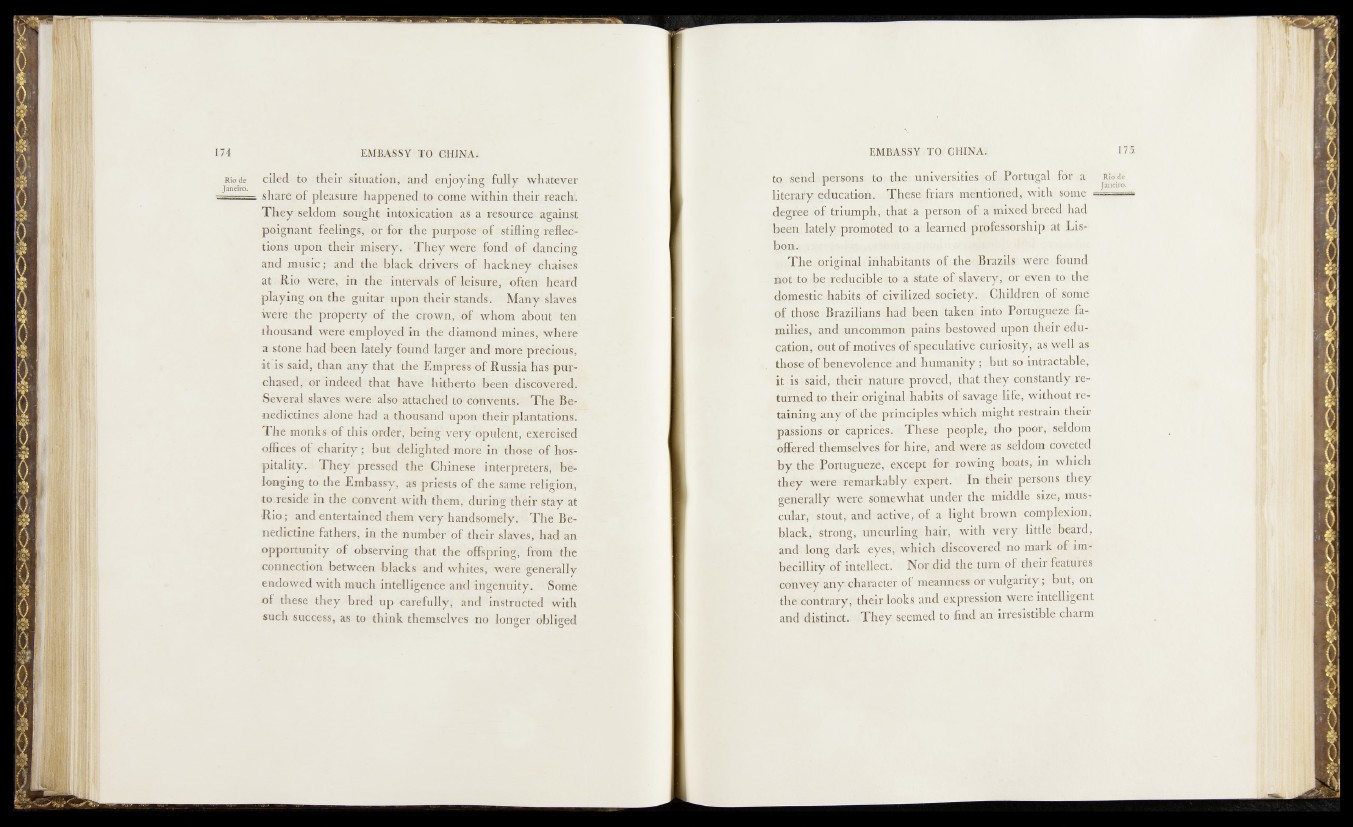
Rio de JaHMio. ciiëd- to thèir situation, and enjoy ing fully whatever
sharê-öf pleasure happgnêditu' coine within their reach;.
They seldom soughtiintoxication as a resource* against
poignant feelings^ or'for the pprpose'ffif.stifling reflections
upon their^miseiy*. ■ They wereffond of^'dancing
and musie; aad; the Mack drivers-of hackney *dhkises
at RieWere,' in theffitervals of-steisure, often heard
pdayingffin the. guitar upon their stands. Many-staves
wene thespmperfy of the ^rown/^f , whom kbofif'fon
thousand were employed In thediamond minés, where
a stone had heen lately found larger and ffioreprecfous,
it is said, than any that the Tmpffissjof Russ^ has pur-
tifped# 'hr indeed that have hitherto -;fieej* discovered.
Several slaves were also attached toeottveffim| The Benedictines
alone had a thousand upon their plantations.
The monks o f this order, being very '?épulènt,-e'xëroMid
offices of charity ; but delighted ffiörC in those -of hos<-
pitalityh Theyipressed the Chinese interpfetersVsshe-
longiftg to the Embassy, a® prifsts of the saffie
te.residein thë convent with them, during théir Stayat
Rio.; and entertained them very handsomely:4-Thfe; Benedictine
fathers, in the numberffif their slaves, had:®n
opportunity of observing that the tffiprif^j ^ ff i "tile
connection between blacks and whites; wéife -generally
endowed with much int^llgetïéehrid MgëMfity»^ ’Soffie
o f these they bred up carefully, and instructed with
«ach success, as to think themselves no longer obliged
to:thesmnaversities /of Portugal for
literacy edtteat-ioft.i.'Thas^friars mentioned^.with some -
degree oh triumph; (that, a .person oh a mixed breed had
been lately promoted to :a..learned professorship at lis -
^^The.origipkl. inhabitants of theoBrazils were found
not to beiiedncfole to <a statoof slavery!,-jpr«. even to,the
demestic habiis o f civilizedisooiety. ' Children iof isome
of those Brazilians had.been; fffiken info.ffiortugaeze.- fat
milies, and uncoraffidh pains bestowed hpon their education;
out of motives o f specukti ve.hiBioskyytas.well as
those’of benevofoneibiand humanity; blife so intractable)
it is said, their natureeprbyed,' thabthey cohatantly yCr
turned to their original habits of sarpagelile:, without se4
tainingj.any of the principles which might restrain their
passions or caprices. g Theses people, tho poor, > seldom
offered themselves for hire,» and were^usjscldonj coveted
b y the Portugueze, except for roWingdbnats, in which
theyh»®*^ffkablyjexpert. In their persons they
generally here sbmtewhat’ dadfer the middle size, muscular,
stout, and active, of a light brown complexion,
hlath;i'Stfffi£g, ubettrlinghair, with very ilittl^ beard,
and long dark eyes',1%hieh,||hfQ'»vered no mark of im-
beoillity of intellect J"'Norff id the turn of their, features
c o n v e y any character of meanness; or vulgarity; but, on
thecontrary,: theip looks add expression were intelligent
and distinct. They seemed to find m irresktifelemharm
Rio de
Jftièiro.